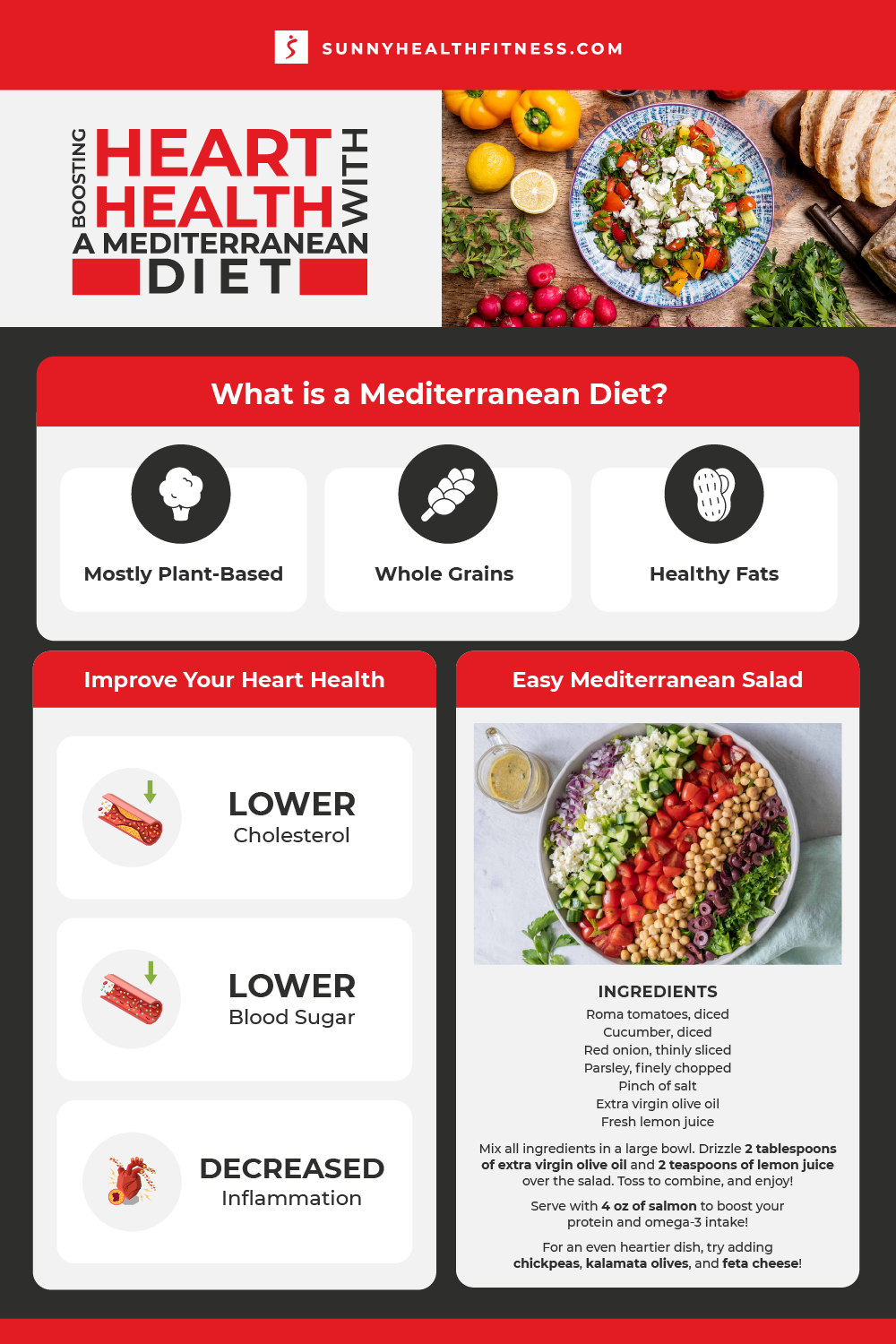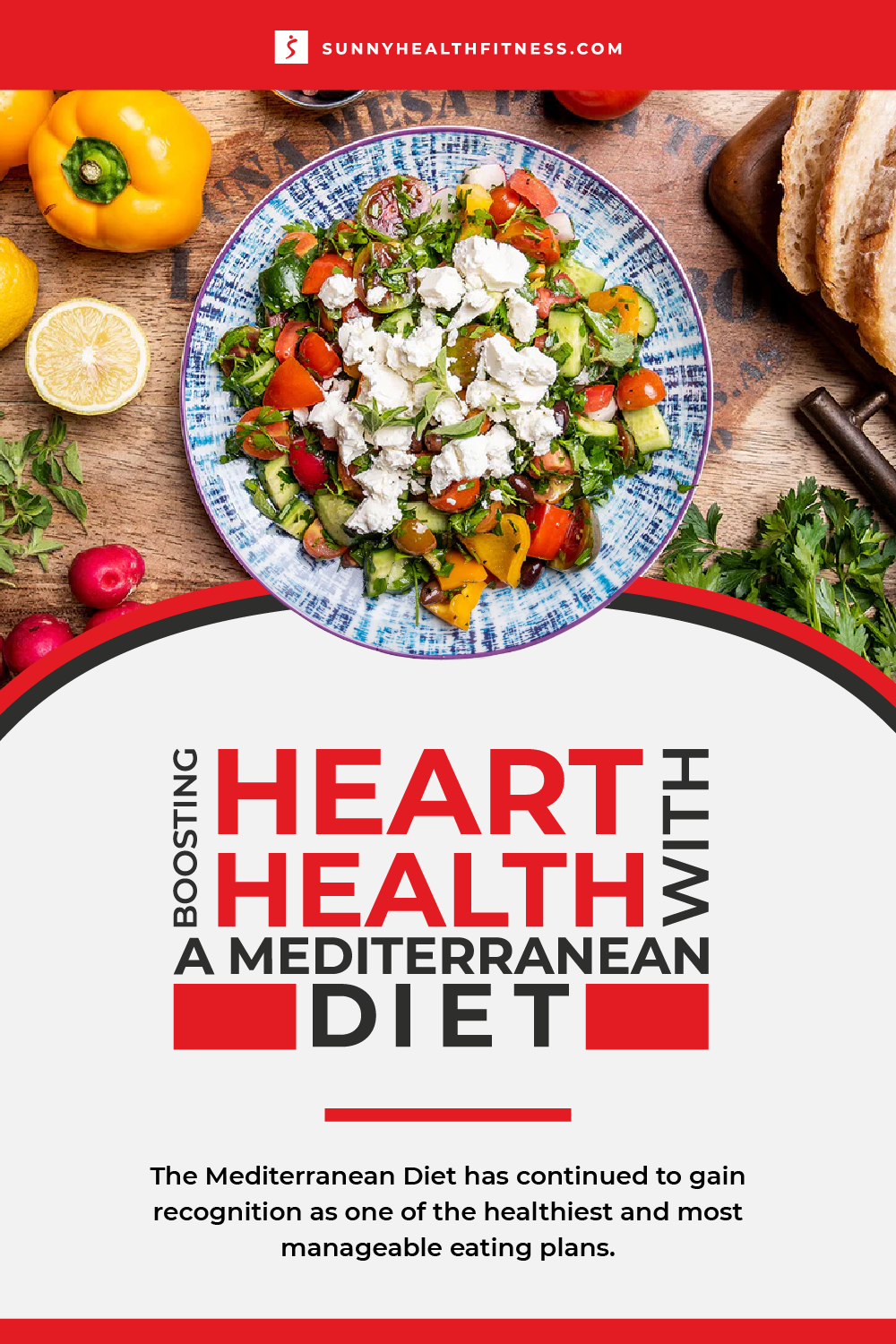Published 2/12/2024, updated 1/29/2026
Long touted by experts as a key to longevity and extended health span, the Mediterranean Diet has continued to gain recognition as one of the top healthy and manageable eating plans.
One of the main reasons the Mediterranean Diet is successful is that it is less of a traditional diet and more of a lifestyle. You don’t have to restrict yourself to bland proteins and flavorless veggies – far from it. The Mediterranean Diet takes the foundations of a healthy eating plan and adds rich spices and cooking methods of the Mediterranean. The primary focus of the Mediterranean diet is placed on what healthy foods you can ADD to your diet, rather than limiting what foods you eat.
Let’s talk about why you might consider making this dietary change, and how you can incorporate it in your own lifestyle!
What is a Mediterranean Diet?
There are no specific parameters of the Mediterranean diet, rather it embodies characteristics that make up the cuisines of most Mediterranean regions. This looks like lots of veggies, fruits, whole grains, beans, nuts and seeds, olive oil, lean meats, and tasty herbs and spices. While the diet is not strictly vegetarian or vegan, it is low in red meat, dairy, and processed sugary foods.(1) Here are a few main things to consider when choosing a Mediterranean diet:
Plant Based is Best
Meals are centered on fresh produce, beans, and whole grains. Rather than having meat as the primary focus, dietary protein is typically fulfilled through plant sources. While you don’t need to cut out animal products completely, focus on consuming moderate amounts of dairy, poultry, eggs, and seafood. Red meat is eaten sparingly (1-2 times per month, or on special occasions).
Whole Grains
Carbohydrates should predominantly be consumed as less processed options such as barley, brown rice, millet, oats, wheat, rye, and spelt.
Healthy Fats
Having a diet that includes fat is important for maintaining sufficient energy levels and vital physiological functions throughout your body. Emphasize foods that contain mostly unsaturated fats, with less saturated and trans fats. Olive oil is one unsaturated fat that the Mediterranean regions are well known for. You’ll also want to prioritize polyunsaturated fats from seafood, seeds, nuts, and legumes. Get your fill of healthy omega-3 fatty acids from fatty fish like salmon, anchovies, herring, mackerel, and sardines.
Improve Your Heart Health
The Mediterranean Diet is renowned for its ability to improve heart health through modification of risk factors. This means that it is effective in lowering certain risk factors that are correlated with cardiovascular disease.(2)
Lower Cholesterol
Research observes that elevated levels of LDL cholesterol (“bad” cholesterol) is highly correlated with cardiovascular (CV) disease. A diet high in unsaturated fat effectively reduces LDL while increasing HDL cholesterol (“healthy” cholesterol). What’s more, a diet rich in polyunsaturated fats is linked to lower risk of CV disease and death related to CV disease.
High fiber foods present in the Mediterranean Diet, such as vegetables and whole grains, also work toward reducing LDL cholesterol.
Lower Blood Sugar and A Healthier Gut
Not only do high fiber foods help support healthy cholesterol levels, but they also aid in decreasing blood sugar and supporting gut health. Both are linked to a healthier heart!
Decrease Inflammation
Omega-3 fatty acids, often found in fatty fish, are linked to less long-term inflammation. Inflammation is a normal part of many physiological processes, especially the healing process. However, it can become problematic when prolonged. Sustained inflammation has been linked to an increased probability of CV disease and other chronic illnesses.
How to Get Started
Establishing a new method of eating can feel overwhelming. Where to start? What to eat? When to eat it? Luckily, with the Mediterranean diet, you don’t have to stress as much. There are no strict parameters, so you won’t have to feel like you’re constantly limiting yourself. Here are a few things to focus on when getting started.
Add!
Before cutting anything out, take stock of your current eating habits. Chances are, you could add more fruits, veggies, and whole grains to your meals. You can also focus on incorporating more seafood, nuts, and spices.
One of the best things about this diet is all the yummy things you get to ADD to your meals, with just a few foods that should be eaten in moderation. It feels practical and doable without completely restricting yourself.
Reduce! (But Don’t Eliminate)
If you love eggs, yogurt, and the like, not to worry. Strive to reduce the amount of dairy and red meat you’re taking in each week but don’t stress about cutting it out entirely. Start with reducing dairy products to 2-3 times per week and red meat 1 time per week. From there you can reduce further as you become accustomed to this change.
Avoid desserts high in added sugar. Again, it’s not necessary to eliminate desserts from your diet completely, but save sweets for special occasions only.
Easy Mediterranean Salad

This mediterranean salad is delicious, quick, and easy. Serve with 4 oz of salmon to boost your protein and omega-3 intake!
To taste:
- Roma tomatoes, diced
- Cucumber, diced
- Red onion, thinly sliced
- Parsley, finely chopped
- Pinch of salt
- Extra virgin olive oil
- Fresh lemon juice
Mix all ingredients in a large bowl. Drizzle 2 tablespoons of extra virgin olive oil and 2 teaspoons of lemon juice over the salad (or more if you like extra dressing). Toss to combine, and enjoy!



























Add Your Name & Email
Please enter your name and email to continue.We won’t display your email publicly.